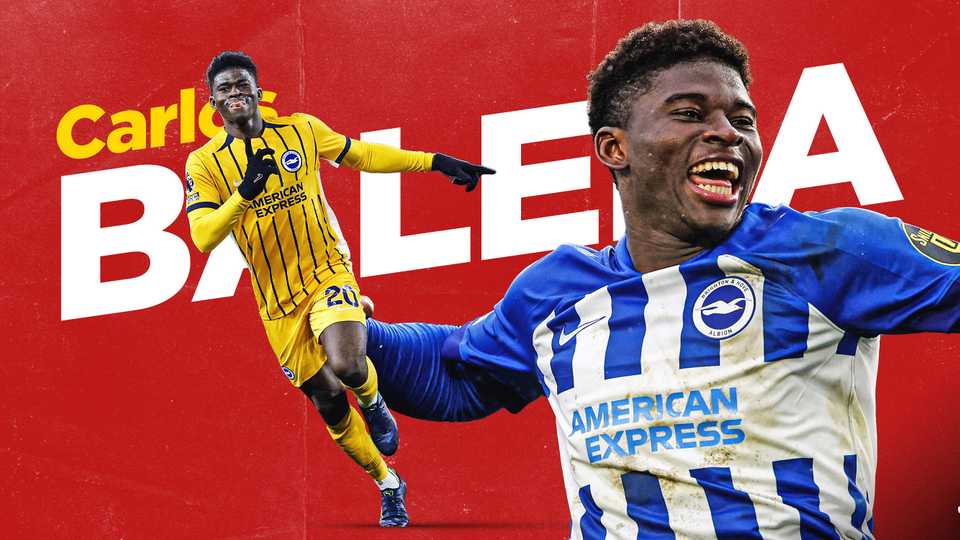Liverpool eyeing £100m deal for Premier League star who wants the Ballon d’Or

The summer transfer window continues to generate compelling narratives across European football, with Liverpool Football Club emerging as a significant player in one of the most intriguing stories of the season. According to recent reports from Caught Offside, the Merseyside giants have officially entered the race to secure the services of Brighton & Hove Albion’s dynamic midfielder Carlos Baleba, a player whose astronomical valuation of £100 million reflects both his exceptional talent and the fierce competition surrounding his potential acquisition.
The pursuit of Baleba has evolved into a fascinating seven-club contest that reads like a who’s who of English football’s elite establishments. Liverpool finds themselves competing against an impressive array of Premier League powerhouses, including Manchester United, Arsenal, Chelsea, Manchester City, Newcastle United, and Tottenham Hotspur. This remarkable level of interest from England’s most successful clubs underscores the widespread recognition of Baleba’s extraordinary potential and his anticipated trajectory toward becoming one of Europe’s premier midfield talents.
The involvement of such prestigious clubs creates a compelling dynamic that extends far beyond simple transfer negotiations. Each of these organizations brings unique advantages to the table, from Manchester City’s recent Champions League triumph and domestic dominance to Arsenal’s renewed ambitions under Mikel Arteta, from Chelsea’s substantial financial resources to Manchester United’s historic appeal and global reach. Newcastle United represents the emerging force of Saudi Arabian investment, while Tottenham offers the prospect of regular European competition and development under experienced management.
Liverpool’s entry into this competitive landscape signals their serious intent to strengthen their midfield options, despite manager Arne Slot’s recent comments suggesting satisfaction with the current squad composition. The club’s interest in Baleba represents a strategic long-term investment that could reshape their midfield dynamics for years to come.
At just 21 years of age, Carlos Baleba has already established himself as one of the most promising young midfielders in European football. The Cameroonian international’s journey to Premier League prominence has been nothing short of remarkable, showcasing the kind of rapid development that has become synonymous with Brighton’s exceptional recruitment and player development strategies under the stewardship of technical director Dan Ashworth and his successor.
Baleba’s playing style combines the physical attributes necessary for Premier League success with the technical sophistication that separates good players from truly exceptional ones. Standing at an imposing height with excellent athletic capabilities, he possesses the defensive instincts and positional awareness that make him equally comfortable breaking up opposition attacks and initiating his team’s forward momentum. His passing range demonstrates remarkable maturity for a player of his age, capable of executing both simple possession-maintaining passes and ambitious long-range distributions that can unlock defensive structures.
The young midfielder’s defensive contributions extend beyond simple ball-winning activities. His ability to read the game, anticipate opposition movements, and position himself strategically makes him an invaluable asset in both organized defensive phases and counter-pressing situations. These qualities have made him an integral component of Brighton’s tactical approach under Roberto De Zerbi and now Fabian Hurzeler.
Perhaps most impressively, Baleba’s attacking contributions have grown significantly throughout his time at Brighton. His ability to arrive in dangerous positions, contribute to build-up play, and provide goal-scoring threats from midfield positions adds a valuable dimension to his overall profile. This versatility makes him particularly attractive to clubs operating with complex tactical systems that require midfielders to fulfill multiple roles within the same match
One of the most intriguing aspects of Baleba’s profile is his publicly stated ambition to win the Ballon d’Or, football’s most prestigious individual award. This declaration, far from representing youthful arrogance, demonstrates the kind of elite mentality and self-belief that characterizes the world’s best players. The reference to Manchester City’s Rodri, who claimed the 2024 Ballon d’Or, provides a relevant comparison point for understanding Baleba’s aspirations and the trajectory he hopes to follow.
Rodri’s success story offers a compelling blueprint for how defensive midfielders can achieve individual recognition at football’s highest level. The Spanish international’s combination of technical excellence, tactical intelligence, and consistent performance across multiple competitions ultimately earned him recognition as the world’s best player. Baleba’s stated desire to follow a similar path suggests not only personal ambition but also a sophisticated understanding of how modern midfielders can influence games and earn individual accolades.
This mindset becomes particularly relevant when considering Liverpool’s historical success in developing players who achieve global recognition. The club’s recent track record includes players like Virgil van Dijk, Mohamed Salah, and Sadio Mane, all of whom have finished in prominent positions in Ballon d’Or voting during their time at Anfield. The prospect of joining an organization with such a proven ability to elevate individual careers could prove decisive in Baleba’s decision-making process.
The timing of Liverpool’s interest in Baleba raises fascinating questions about their long-term midfield planning under Arne Slot’s management. The Dutch coach inherited a squad that underwent significant midfield restructuring during Jurgen Klopp’s final seasons, with the departures of established figures like Jordan Henderson and Fabinho creating opportunities for younger players to establish themselves.
Current midfield options at Liverpool include established players like Alexis Mac Allister, Dominik Szoboszlai, and Curtis Jones, alongside emerging talents such as Harvey Elliott and Ryan Gravenberch. The potential addition of Baleba would add another dimension to this group, providing additional depth, competition for places, and tactical flexibility that could prove crucial across a demanding season featuring multiple competitions.
Slot’s tactical preferences, developed during his successful tenure at Feyenoord, emphasize the importance of midfielders who can contribute effectively in both defensive and attacking phases of play. His system requires players capable of maintaining possession under pressure, creating opportunities for forwards, and providing defensive stability when required. Baleba’s profile appears to align perfectly with these requirements, suggesting that his potential arrival could enhance Liverpool’s tactical versatility significantly.
The financial aspect of this potential transfer cannot be overlooked. Brighton’s £100 million valuation reflects both their reluctance to lose a prized asset and the current market dynamics that have inflated transfer fees for promising young talents. For Liverpool, committing such resources to a single player would represent a significant departure from their typically measured approach to transfer spending, potentially indicating their belief that Baleba represents a generational talent worth such investment
Brighton & Hove Albion’s position in this transfer saga adds another layer of complexity to proceedings. The club has established itself as one of the Premier League’s most astute operators in the transfer market, consistently identifying undervalued talents, developing them effectively, and eventually selling them for substantial profits. This business model has enabled Brighton to maintain their Premier League status while operating with relatively modest resources compared to their competitors.
The potential departure of Baleba would represent another significant sale following the successful transfers of players like Marc Cucurella, Yves Bissouma, and Ben White in recent years. However, Brighton’s £100 million asking price suggests they are in no hurry to part with their prized midfielder, particularly given their improved financial position and ambitions for European qualification.
Brighton’s negotiating position is strengthened by Baleba’s contract situation and their track record of maximizing transfer fees for departing players. The club’s reputation for shrewd business dealings means that any successful suitor will need to meet their valuation or risk missing out on the opportunity entirely.
Each of Liverpool’s competitors brings distinct advantages that could influence Baleba’s ultimate decision. Manchester City’s recent success, including Champions League victory and consistent domestic dominance, makes them an attractive proposition for any ambitious player seeking immediate silverware and the opportunity to work with Pep Guardiola. Their successful integration of young midfield talents like Phil Foden and the recent success of Rodri provides a clear pathway for Baleba’s development.
Manchester United’s historic appeal and global reach cannot be understated, despite their recent struggles for consistent success. The club’s willingness to invest heavily in young talent and their need for midfield reinforcement could make them aggressive suitors. Additionally, their recent appointment of Ruben Amorim as manager might appeal to players seeking to work with innovative coaching approaches.
Arsenal under Mikel Arteta has emerged as genuine title contenders, offering the combination of ambitious project management, consistent Champions League qualification, and a clear tactical identity that emphasizes technical midfielders. Their successful integration of young talents like Martin Odegaard and Declan Rice demonstrates their commitment to building around promising midfield players.
Chelsea’s substantial financial resources and recent transfer activity indicate their willingness to compete at the highest level for emerging talents. Despite recent inconsistencies, their London location and historical success continue to attract ambitious players seeking career advancement opportunities.
Newcastle United represents an interesting alternative, offering the prospect of being part of a rapidly ascending project backed by substantial investment. Their recent qualification for European competition and ambitious long-term planning could appeal to players seeking to be part of something special from the ground up.
Tottenham’s consistent European qualification and reputation for developing young talents provides another compelling option, particularly given their need for midfield reinforcement and their willingness to provide opportunities for promising players to establish themselves.
Liverpool’s approach to this transfer race reflects broader strategic considerations beyond simply acquiring another talented midfielder. The club’s recent success under Jurgen Klopp was built upon identifying players who could improve significantly within their system, rather than simply purchasing established superstars. This philosophy appears to continue under Arne Slot’s management, with Baleba representing exactly the kind of investment that could yield substantial long-term dividends.
The potential signing would also represent a statement of intent regarding Liverpool’s ambitions for the coming seasons. Competing successfully for a player of Baleba’s caliber against such distinguished opposition would demonstrate their continued relevance among European football’s elite establishments and their determination to remain competitive across multiple fronts.
From a tactical perspective, Baleba’s arrival could facilitate various system adjustments that might benefit Liverpool’s overall performance. His defensive capabilities could provide additional security in matches where Liverpool opts for more attacking approaches, while his passing ability could enhance their build-up play from deeper positions. The versatility he offers would give Slot greater tactical flexibility in different competition contexts
The £100 million price tag associated with Baleba’s potential transfer represents a significant financial commitment that would likely rank among Liverpool’s largest ever expenditures on a single player. This level of investment requires careful consideration of both immediate impact and long-term value proposition, particularly given Liverpool’s traditionally measured approach to transfer spending.
However, several factors could justify such expenditure from Liverpool’s perspective. Baleba’s age means that any investment would likely retain substantial value over time, potentially appreciating if his development continues positively. The competitive nature of modern football means that securing exceptional talents often requires significant upfront investment to prevent competitors from gaining advantages.
Additionally, the potential return on investment extends beyond simple playing contributions. Baleba’s commercial appeal, international profile, and marketability could generate substantial revenue streams that offset initial transfer costs. Liverpool’s global fanbase and commercial partnerships create opportunities for maximizing such returns effectively
The Carlos Baleba transfer saga represents more than simply another high-profile summer transfer story. It encapsulates the current dynamics of elite European football, where clubs must balance immediate competitive needs with long-term strategic planning, while operating within increasingly complex financial and regulatory frameworks.
For Liverpool specifically, the pursuit of Baleba reflects their continued ambition to compete at football’s highest level while adapting to new management approaches under Arne Slot. The successful acquisition of such a highly sought-after talent would signal their determination to maintain their position among European football’s elite establishments.
The broader implications extend to transfer market dynamics, where clubs increasingly compete not just for established stars but for promising talents whose potential value could dwarf their current market price. Baleba’s situation exemplifies this trend, with multiple elite clubs recognizing his potential impact and investing accordingly.
Regardless of the ultimate outcome, the Carlos Baleba transfer race provides fascinating insights into modern football’s complexities, from tactical considerations and financial planning to competitive positioning and long-term strategic thinking. Liverpool’s involvement demonstrates their continued relevance in such discussions and their determination to secure the talents necessary for sustained success.
The coming weeks will likely determine whether Liverpool’s interest translates into concrete action, and whether their combination of tactical appeal, developmental track record, and competitive ambition proves sufficient to secure one of European football’s most promising young talents. Whatever the outcome, their participation in this race reinforces their status as serious contenders for football’s most coveted prizes, both on and off the pitch.















